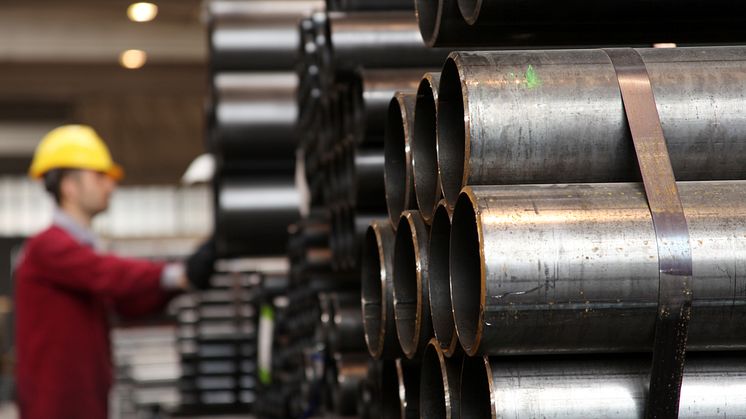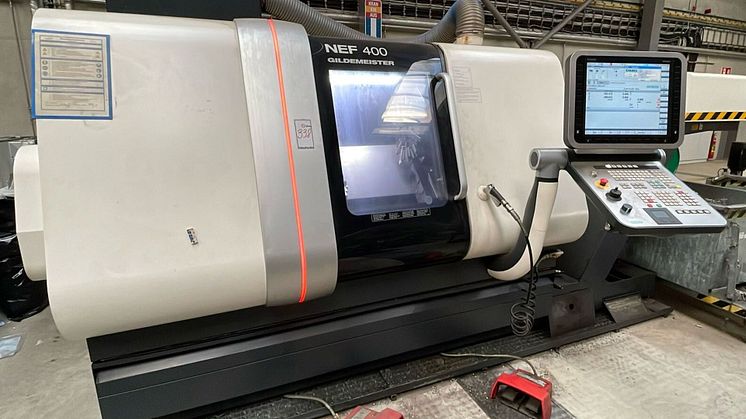
Press release -
Used machines: New paths in pipe production
They are encountered more often than you might think and are essential in many branches of industry: tubes. How today's production has been optimised, which areas of application pipes are used in and how used machines can be a sensible investment for more sustainable production.
The history of pipe production is closely linked to the industrial revolution and the rise of steam engines. These machines revolutionised production in many areas, but placed new demands on material durability and manufacturing techniques. A key problem was the unreliability of the pipes commonly used at the time, which were manufactured from pressed sheet metal with seams welded together. Under the high pressure of the steam flowing through them, these seams tended to burst, which not only jeopardised the pipes, but often the entire machine.
The Mannesmann brothers brought about the decisive turning point with their innovation in the 1880s: They developed a process for the manufacturing of seamless tubes. Their approach consisted of heating steel rods and then pressing and turning them through a combination of Rollers and a mandrel, creating a hole in the centre and thus forming a seamless tube. For pipes with a larger circumference, the pilger cutting process was developed. The surface treatment on the inside and outside provided the necessary smoothness and quality.
These innovative methods revolutionised pipe production. They not only improved the safety and performance of the pipes themselves, but also of the machines and systems in which they were used. The Mannesmann brothers thus laid the foundation for modern pipe production, which to this day is based on principles that they played a decisive role in shaping.
Pipes in use
Pipes have become an integral part of our modern infrastructure. They are used in numerous areas that are essential for everyday life and industry. The versatility and adaptability of pipes allow them to be used in a wide variety of contexts:
Water supply and wastewater disposal: They form the backbone of the urban infrastructure by supplying drinking water and safely discharging wastewater.
Energy supply: In the gas and oil industry, pipes are used to transport fuels over long distances, from extraction sites to consumers.
Construction: They contribute to the stability of buildings and are used for aesthetic design as well as for Heating Apparatus and cooling systems.
Industrial applications: In the automotive and mechanical engineering industries, tubes are essential for conducting liquids and gases and as structural components.
Technology: They are used in electronics for specialised applications such as cooling components.
Renewable energies: Pipes are used in geothermal and biogas plants to utilise natural resources efficiently.
The versatility and adaptability of pipes allows them to fulfil critical functions in almost every aspect of daily life and industry, from basic infrastructure to advanced technological applications.
Future-orientated investment: Used machinery: in pipe production
The future of pipe production holds many challenges, including increasing demands for efficiency, sustainability and the integration of advanced technologies. In this dynamic environment, the purchase of used machinery for pipe production offers a strategic opportunity to meet these challenges. Used machinery is not only cost-efficient, but also allows companies to flexibly adapt and expand their production capacities without having to invest in expensive new equipment. Used machinery: can also help to conserve resources and improve the sustainability of production processes by utilising existing resources more effectively. This pragmatic approach allows companies to adapt quickly to changing market conditions and at the same time make a contribution to environmentally conscious behaviour.
The industrial auction house Surplex.com specialises in trading used machinery and is currently offering over 380 high-quality machines for auction following the partial liquidation of steel tube producer Vallourec. Auctions are being conducted under the guidance of Hilco Industrial, the exclusive marketing and sales agent for Vallourec Germany. Vallourec is a renowned company in the production of seamless steel tubes and specific tube applications for the energy sector. Following the partial closure of its plants in Düsseldorf and Mülheim an der Ruhr, the company is now offering its used machinery from various fields of application. Among other things, a DMG CNC Lathe, a DMG Vertical Machining Centre, a PS CNC Milling Machine and BOEHRINGER Cycle Lathes are up for auction until 26/03/2014. Some of the machines can be viewed via an online 3D tour.

Related links
Categories
About Surplex
Surplex has been one of Europe’s leading industrial auction houses for 25 years and trades worldwide in used machines and factory equipment. The 18-language auction platform Surplex.com has over 125,000 registered customers. Around 1,000 online auctions are held annually, with more than 400,000 industrial products sold to date. The company is based in Düsseldorf and has offices in 16 European countries. More than 220 employees from 27 different nations provide a full service in 20 languages.



